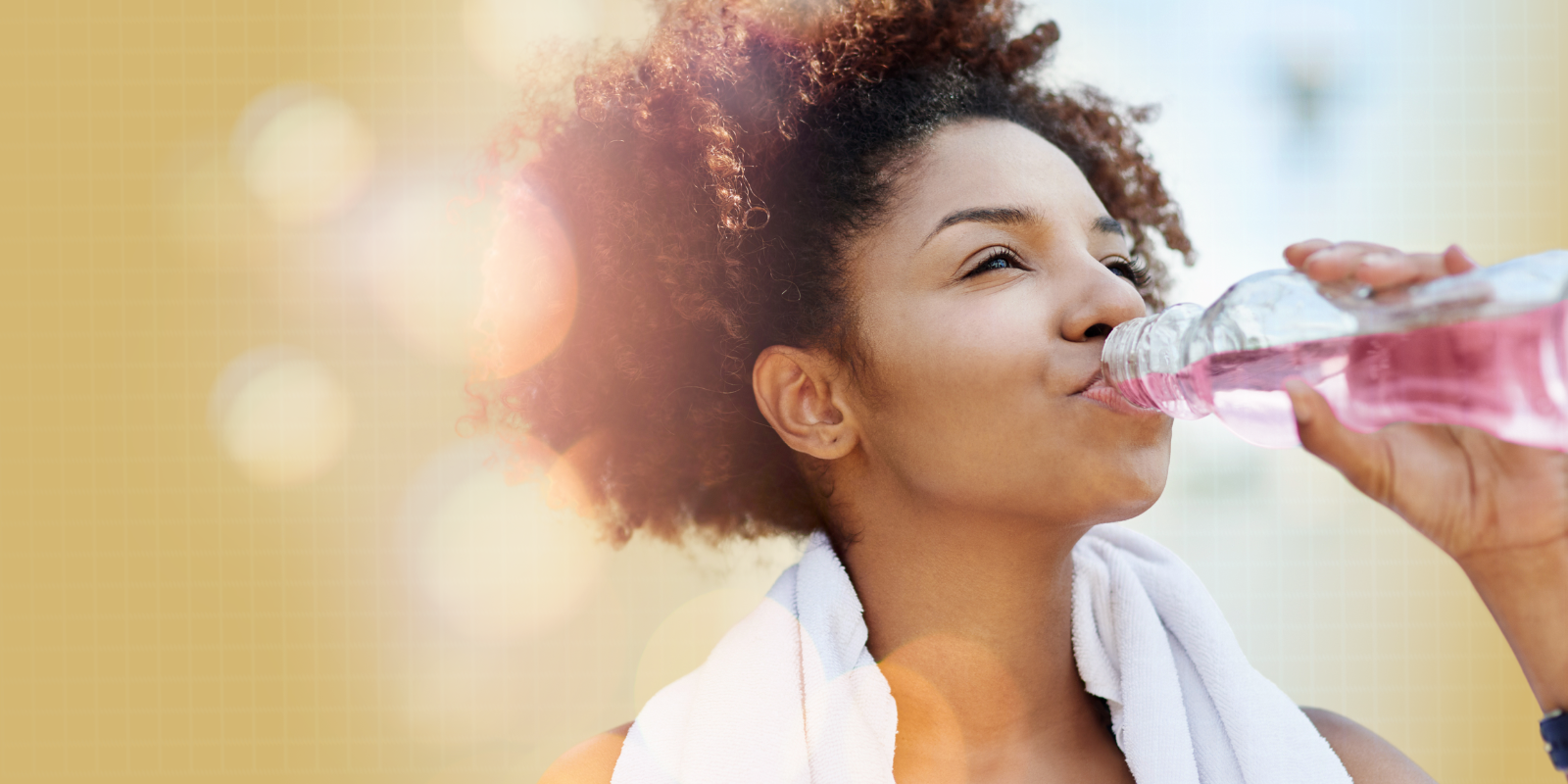Why do our bodies and our cells need water? And how much water do we need?
It’s central to who we are. As land based organisms, we originally evolved from the ocean. Today, humans are still 60% water.
If we're a 60% bag of water, then there's got to be water coming in and water going out. And those two things have to balance over time – how much water we need equals how much we're losing in urine, evaporation, sweat and our breath.
Water moves things around our body, dissolves things and is vital to the way our body functions inside and outside of cells.
As a ballpark number, the minimum amount of water intake would be around two liters a day for women and about three liters a day for men.
That's not just drinking straight from your water bottle. You do get some of that water intake from food and such, correct?
Absolutely. It depends on the kind of foods that you eat, but maybe 20% of our total daily fluid intake comes from the foods that we eat.
Can you explain what electrolytes are and why our body needs them?
Fundamentally, electrolytes are minerals. Another word would be salts. Another word might be chemical elements like you'd see on the periodic table, if you remember high school.
We're talking about things like sodium, potassium, calcium, magnesium. There are many of them, but these are atoms that typically travel around with a charge on them, positive or negative. A charged atom is an ion, and the world wants to balance pluses and minuses. Salts are combinations of pluses and minuses that have a balanced charge.
Salt is sodium chloride – that would be sodium with a positive, chloride with a negative. Put together that’s a neutral charge – that's what a salt is. And then when you put those in the water, the water has its own charge qualities and it pulls salts apart to free the component atoms. That's what dissolving salt in water is, and that then allows some charged ions in the water to move around.
And why does our body need electrolytes as part of its operational processes?
They're important in electrical conduction, and there's a lot of electrical things that happen in our bodies. Our nerves conduct electricity. They communicate with each other through changes in the charge across the membrane. And so, electrical impulses in muscles and in nerves require these different ions or electrolytes to function normally. Sodium and potassium are the main electrolytes in the body, and water will follow the electrolytes. Why is that important? Well, it's that combination of salt and water that helps keep our blood pressure up and keep our kidneys working.
Do we need more water in Colorado at altitude?
Yes, our bodies need more water here in Colorado since one of the ways we lose water is through evaporation. Evaporation is dependent on barometric pressure, because if the air is pushing down, then it's hard for water to evaporate. Here in Colorado, we have low barometric pressure because of our altitude, so things tend to evaporate more here. But it also tends to be dry here, meaning the humidity is low.
When there's already a bunch of water in the air, you don't evaporate as much. Here, we don't have much water in the air, and so we evaporate more. Temperature and wind affect that as well. If it's hot, we evaporate more and lose more through evaporation, and wind will tend to take whatever's evaporated from your skin and move it away. If that cools us off, that's how sweat results in cooling. But if it's windy, then there's more evaporation as well.
Are there differences in symptoms between dehydration and not enough electrolytes?
When clinicians are in the hospital, we see people with not enough electrolytes. Things like low potassium or low calcium. And those can have specific symptoms. Because these electrolytes affect electricity, you can feel cramping or tingling or numbness when the amount of these specific electrolytes are low.
Officially, dehydration is when you don’t have enough water in your body. The symptoms of dehydration are low blood pressure, lightheadedness, dizziness and low urine output. This is because as the water goes down, our body tries to maintain the sodium concentration where it should be, so the kidneys adjust to this. If you don't make enough urine because you are dehydrated, you're not getting rid of the toxic stuff that your body needs to get rid of. And so those toxins build up in the body.
Can you be overhydrated?
Yes. The best way to know if you're drinking enough is if you are urinating and the color of your urine. Lighter color and frequent urination? Your body and kidneys are telling you, “Yeah, we got enough here. Come on, let's get rid of this extra water." Conversely, darker urine is a sign you need to hydrate.
But most of us don’t overhydrate because it wouldn’t feel good to keep adding water to your system.
Are there any situations that a sports drink would be the correct choice over just regular water?
Yes, in situations where vomiting and diarrhea are a concern and people are having trouble keeping enough fluid and electrolytes. So a drink that can replenish both becomes useful, especially if someone is not keeping solid food down.
Of course, sports drinks are marketed for exercise. For most instances, water will work just fine. If you are exercising hard – sweating and breathing a lot for over an hour – that’d be a place you might want to consider a sports drink.
What are the shortcomings of sports drinks?
I think a lot of people drink sports drinks because they taste good and they're sweet – similar to how people drink soda or other sugar-sweetened beverages. In that context, we need to be mindful about how much sugar these drinks have. You’re getting calories without a lot of quality nutrition.
Also, there's some evidence that our bodies don't sense liquid calories as well. They kind of go right through your stomach. So you might drink something, and you're getting extra calories, but your body doesn't actually sense those calories very well.
Put another way, people are not great athletes because they drink a sports drink; they drink a sports drink because they’re great athletes.
Some beverage companies offer powders or sugar-free additives that you can add to water or are standalone sugar-free products. Would these be applicable in the same sickness or periods of extended, high-intensity exercise?
Yes, I think these have the same benefits. Likewise, if there's no sugar in the product, it's probably better for you. If what you're looking for is water plus electrolytes because you're losing both through sickness or intense exercise, then a powder plus water is just as good as putting them together and putting some food coloring in it and selling them in a bottle. I think that would be equivalent and maybe even preferred, if there's no glucose in it.
What about the hydrating effects of things from coconut water, specialty juices or even milk?
Yeah, there's no end to what people might consider buying for hydration! (Laughs)
Ultimately, I think people want to be healthy. As a culture we seem to have a bias towards wanting things that are “natural.” And natural doesn’t necessarily totally equate to being healthy all the time.
So for something like coconut water, people have been drinking it for thousands of years. What does it have in it? Coconut water has glucose, carbohydrates and some electrolytes – not very much and certainly not as much as a sports drink would. I looked at coconut water specifically, and there's some interesting animal studies that show possible beneficial effects of coconut water for things like triglycerides or blood sugar. However, I must say, I don't find those studies very compelling. And I found really no human data that was of high quality on coconut water.
Milk has some protein in it. It has some fat. Those are relatively good nutrients. The fat in milk is saturated fat, and some people worry about that, but it's a good source of calcium, and a lot of people would rather get their calcium from a dairy than from a pill or from spinach or something like that.
So, I think getting nutrients from liquids is a reasonable thought. You get a lot more nutrients from foods, though.
What type of milk should I drink? A registered dietician weighs in.
This interview was edited for length and clarity.



.png)
.jpg)
